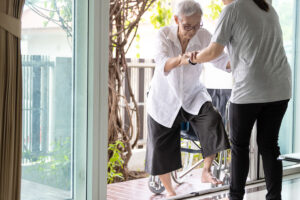
If your loved one fell and got hurt while residing at a nursing home, you may need to take immediate action to safeguard their health and legal rights. Our lawyers at Dalli & Marino, LLP can help protect your loved one’s rights and get them the compensation they deserve. Here’s an overview of the dangers and consequences of nursing home falls and how an experienced nursing home negligence attorney can help you keep your loved one safe.
What Are the Dangers of Falls for Older Adults?
Falls constitute one of the leading causes of accidental injuries in older adults, according to the Centers for Disease Control and Prevention (CDC). Millions of older Americans seek emergency medical care for falls every year and nearly a third of them end up hospitalized. Injuries commonly associated with elderly individuals falling include:
- Traumatic brain injuries
- Hip fractures
- Broken wrists, arms, or ankles
- Back injuries
- Debilitating soft tissue sprains or tears
A fall injury can take an especially heavy toll on an older person. Often, the trauma inflicted by a fall leads to health problems that severely curtail the person’s mobility or limit their independence. Sadly, it’s all too common for a fall to mark the beginning of a steady decline in an elderly adult’s overall health and well-being.
How Falls at Nursing Homes Happen
Given the dangers, nursing homes entrusted with the care of elderly adults have a vital obligation to protect against falls. Fall prevention should be one of the top priorities of any nursing facility that cares for older people. Unfortunately, not all facilities live up to that essential duty.
Falls often happen at nursing homes because nursing home staff and management fail to take the necessary, reasonable steps to prevent them. Examples of the ways that nursing facilities put their residents in danger of falls in those circumstances include:
- Understaffing or staff inattention that leaves residents without the help they need to avoid falling
- Staff members who lack the physical capacity to assist residents
- Lack of adequate fall prevention training for staff
- Inadequate fall safety equipment, like bed rails or handrails
- Inadequate measures to monitor residents who may attempt to get up and around on their own
Nursing homes must stay constantly vigilant to fall risks and treat fall prevention as one of its principal measures of success.
Liability and Compensation for a Nursing Home Fall
Victims of falls at nursing homes have rights to compensation for the harm they suffer. Generally speaking, the law holds nursing home staff, management, and operators — and their insurance companies — liable for the damages residents sustain in a preventable fall. Other parties may also share that liability. The compensation a nursing home resident may seek for losses sustained in a fall spans a wide range of damages, including:
- Medical care in treating a fall injury and associated health complications
- Cost of relocating to an alternative nursing facility, when appropriate
- Other expenses and financial losses flowing from the harm done by a fall
- Physical pain from the injury or medical treatment
- Emotional distress
- Inconvenience and immobility
- Diminished quality of life
If a fall leads to the untimely death of a nursing home resident, their surviving spouse or family may have the right to pursue a legal action for wrongful death. And if the unsafe conditions leading to the fall were especially outrageous or intentional, a lawyer may also be able to pursue a claim for extra, punitive damages against the at-fault nursing home staff, management, or operator.
Seek Immediate Legal Help After a Nursing Home Fall
If your loved one fell and suffered injuries in a fall at a nursing home, it’s best to speak with an experienced nursing home negligence attorney as soon as possible. Filing a complaint without the advice of a skilled lawyer can lead to costly, avoidable mistakes that impair your and your loved one’s rights. Depending on the circumstances, the attorney might advise:
- Immediately moving your loved one out of a nursing home to an alternate facility
- Gathering evidence of the nursing home practices or conditions that led to the fall
- Alerting law enforcement or government agencies to your concerns about fall hazards at the home
- Investigating the ownership and management of the nursing home to determine who might have liability for your loved one’s damages
- Seeking expert medical advice about the impacts of the fall on your loved one’s health and well-being
The best option for your loved one’s situation can vary widely. An attorney’s advice can make a significant difference in the outcomes you can achieve on your loved one’s behalf.
Contact a Skilled Nursing Home Negligence Attorney at Dalli & Marino, LLP Today
A nursing home has a special duty to protect your loved one from a preventable fall. Its failure to do so almost always represents an act of negligence for which your loved one may have a right to claim compensation. Choosing the best way to enforce that right will often require the advice of a skilled attorney.
Dalli & Marino, LLP have years of experience advising and advocating for nursing home residents who have fallen and suffered injuries. We can evaluate your loved one’s situation and explain your rights. Contact us or call (888) 465-8790 for a free, confidential consultation.


